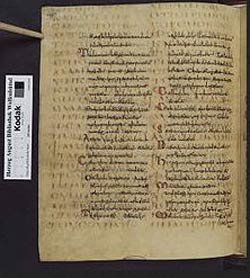Palimpsest Hunt Is On In Sinai Monasteries
Books, Imaging, Michael Toth, Palimpsest, Philology, Science, Sinai Monasteries
Most readers probably remember the Archimedes Palimpsest, the discovery of the survival of seven treatises by the Greek mathematician Archimedes, including his The Method which solved several problems using methods anticipating the Integral Calculus developed by Isaac Newton and Gottfried Leibnitz in the 17th Century, in a palimpsest used to record a 13th century Byzantine prayerbook.
Palimpsests are pages of manuscripts or scrolls from which earlier writings have been scraped away, so that the parchment could be reused to record a different text. This medieval form of recycling inadvertently makes the recovery of the eliminated earlier texts possible when modern sophisticated methods of imaging are used.
The Washington Post recently reported that a team, headed by Michael Toth, a former DOD imaging expert, is working systematically on a project which is examining the very large collection of manuscripts preserved over the centuries in the Greek Orthodox monasteries of the Sinai.
The more prominent legible words are 1,200 years old and are interesting enough, but they are not what the scientists are here for. The team is really after the overwritten text from centuries earlier, last seen by the person who scraped it away to recycle the precious animal-skin parchment.
Such erased texts are known as palimpsests, and until their pages enter the imaging room, no one alive now or, in many cases for more than a millennium, can say for sure what has been hidden. The work is tedious, like carefully brushing away sand at a traditional archaeology dig, but the promise of what can be found is a powerful motivator.
This is Toth and his colleagues’ most ambitious project to date, and it is just one component of a major transformation under way in the desert. The team is working within the stone walls of the Sacred and Imperial Monastery of the God-Trodden Mount of Sinai — St. Catherine’s for short.
For 17 centuries, the Greek Orthodox Christian monks here have protected an unparalleled trove of manuscripts. Now the monastery is in a multimillion-dollar push to physically and digitally protect its treasures and make them easily accessible, in most cases for the first time, to scholars around the world.
In the process, the monks will establish a model for the preservation of irreplaceable ancient manuscripts in a world where more and more of them are threatened by the chaos of war and revolution.
Read the whole thing.
The possibilities are fascinating. We know of countless lost classical works which we moderns would love to get our hands on, poems by Sappho, plays by Aeschylus and Sophocles, the dialogues of Aristotle and the treatises of Plato, that might very possibly have seemed of indifferent interest to Eastern churchmen of the Dark Ages and which could easily have been selected to be scraped away and overwritten with some, at the time seemingly more pertinent, religious text.




